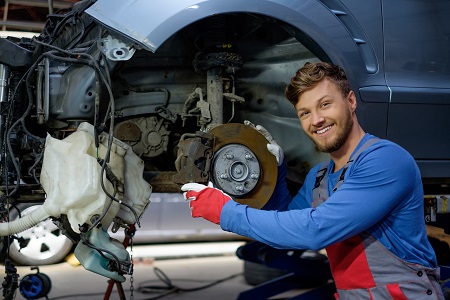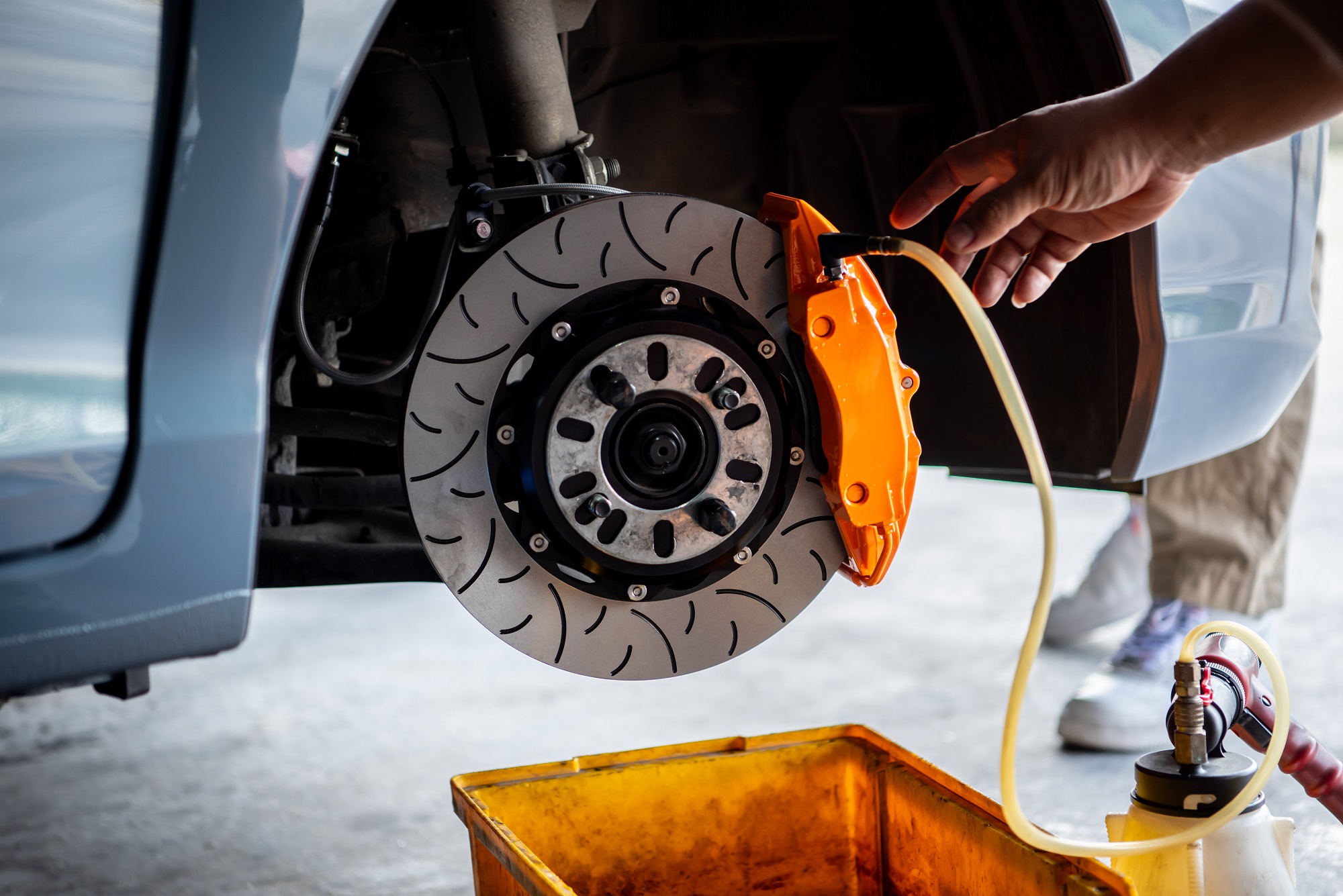You’re cruising along when suddenly, a strange noise or a spongy pedal has you worried about your brakes.
Don’t panic! We’ve got you covered. In this guide, we’ll help you identify common brake problems and what they might mean for your car.
So, let’s dive in because understanding these issues and getting them checked out by your local brake shop isn’t just good for your vehicle; it’s essential for your safety, too.
Symptoms of Brake Problems: What to Look Out For
Pay attention to any unusual noises or vibrations when you’re driving, as they could be signs of brake problems. If you hear a high-pitched squeal when you apply the brakes, that’s often the wear indicator telling you it’s time for new brake pads.
Grinding sounds, on the other hand, indicate that your pads are totally worn out, and metal is rubbing against metal, which can quickly cause serious damage. If your car pulls to one side when braking, that could mean uneven wear or potentially a stuck caliper.
Vibrations could indicate warped rotors. Don’t ignore these signs – get your brakes checked out as soon as possible. It’s not worth risking your safety.
The Issue of Squeaking or Squealing Brakes
When you’re dealing with the issue of squeaking or squealing brakes, it’s important to understand that it’s often a warning sign of potential brake wear or damage. You’re hearing the high-pitched sound as a result of the metal wear indicator rubbing against the brake rotor. This occurs when the brake pads have worn down. It’s a clever feature designed to alert you before the brake system suffers severe damage.
It’s crucial not to ignore this sound; the longer you do, the worse the wear and potential damage can become. Consider getting your brakes checked at a professional auto shop. They’ll likely suggest replacing the brake pads. But remember, it’s not just about replacing parts. The underlying issue could be a lack of lubrication or a misaligned caliper.
Always request a thorough inspection.
Leaking Brake Fluid: How to Spot and Handle It
If you’re noticing a puddle of clear liquid beneath your car, it’s possible you’re dealing with a brake fluid leak, a serious issue that needs immediate attention. This fluid is responsible for hydraulic pressure in your braking system. A leak disrupts this, reducing your vehicle’s stopping power. If your brake pedal feels spongy or goes to the floor, that’s a clear sign.
You can perform a quick check yourself. Use a flashlight to inspect the brake lines, master cylinder, and calipers for wetness or drips. However, don’t rely solely on this. Get your car to a mechanic as soon as possible. It’s not worth risking your safety over.
Dealing With Brake Vibration: Causes and Identification
Let’s now turn your attention to another common brake issue: vibration, which you need to identify and address promptly. It’s often triggered by warped rotors, uneven wear, or loose components.
- Warped Rotors
- The heat generated during braking can warp your rotors, causing a pulsing sensation through the brake pedal.
- Uneven Wear
- Pads and rotors can wear unevenly due to aggressive braking, leading to vibrations.
- Loose Components
- Loose brake calipers or mounting bolts can vibrate when you apply the brakes.
Don’t ignore these signs! They’re warning you of a potential hazard. A vibrating brake system isn’t just uncomfortable—it’s unsafe. By addressing it promptly, you’ll ensure a smoother, safer ride.
Stay vigilant, be proactive, and keep your vehicle in prime condition.
The Dangers and Signs of Brake Fade
Because you’re pushing your brakes to their limits, you’re more likely to experience brake fade, which is a serious safety risk. This occurs when your brakes overheat due to excessive use, causing a reduction in stopping power.
You’ll notice a spongy feel in the brake pedal, and your car won’t stop as quickly. It’s crucial to cool down your brakes if you suspect fade – ease off the pedal and try engine braking instead. Regularly check your brake fluid, too, as it can boil from intense heat, leading to brake fade.
Upgrading to high-performance pads and rotors can also help resist fade. Remember, prevention is key, so don’t push your brakes to the edge.
Addressing the Problem of a Soft Brake Pedal
While dealing with brake fade, you’ve now stumbled upon another issue, a soft brake pedal, and it’s crucial that you address this immediately to maintain safe driving conditions. This isn’t a problem to dismiss lightly, as it could be a symptom of a more serious issue.
Potential causes of a soft brake pedal include:
– Air in the brake lines: This can occur when you’ve recently bled your brakes, and air has somehow entered the system.
– Brake fluid leak: You may notice a puddle of fluid under the car or a reduction in fluid levels.
– Worn brake pads: These can cause your pedal to feel soft due to decreased friction.
Don’t let these issues persist. Get your car checked and ensure your safety.
Unusual Brake Pedal Behavior and What It Means
You’re now observing unusual brake pedal behavior, and it’s essential to understand what this could mean for your vehicle’s safety. If the pedal is hard to press, it’s likely that there’s a problem with your brake booster, a device that uses vacuum or hydraulic pressure to multiply the force you apply to the pedal. If the pedal sinks to the floor, you could be looking at a master cylinder problem. Both scenarios are serious and demand immediate attention.
To troubleshoot, check your brake fluid levels first. Low fluid can cause both hard and soft pedal problems. If it’s not the fluid, it could be air in the lines or a leak. You’ll want to bleed the brakes or seek an expert auto mechanic.
Don’t gamble with brake issues.
Art Morse Auto Repair Has Brake Shop Mechanics that Can Help Fix Any Brake Issue

At Art Morse Auto Repair, we have over 40 years of experience fixing any brake issues you might encounter. From brake pad replacements and brake repairs to changing out rotors, we are highly-trained professionals who don’t just provide brake services. We offer peace of mind.
Here are some common issues we tackle:
- Brake light on:
- – Could indicate low fluid level
- – Could be a sign of an ABS issue
- Screeching or grinding noise:
- It usually means it’s time for new brake pads
- – Ignoring it could lead to costly rotor damage
Don’t wait until things worsen. Trust in the knowledge and expertise of our auto repair professionals at Art Morse Auto Repair. We have been keeping Vancouver’s vehicles safe since 1980, and we are ready to help you with regular brake inspections.
Contact us for excellent customer service.
Other excellent services we provide:
- Auto Repair Services
- Oil Changes
- Tune-Ups
- Check Engine Light Fixes
- And More
Visit our About Us page for more information about our auto shop.

